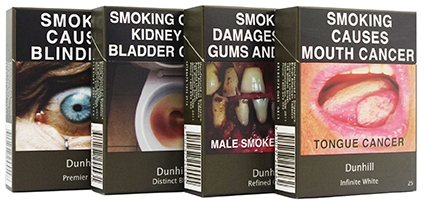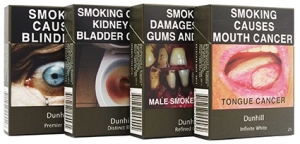International Property Rights Expert on Georgian Plain Packaging
Lorenzo Montanari, Director of the Property Rights Alliance at ‘Americans for Tax Reforms,’ was in Georgia recently on a visit that coincided with the Georgian parliament’s amendments to the law on Tobacco Control, which includes packaging.
According to the new regulations, from 2018 it will be illegal to use a logo and trademark on packages of tobacco products. Conferences ‘Free Market Road’ were held in Tbilisi and Batumi, organized by the New Economic School as a part of the campaign Coalition for Economic Growth that is being held in Europe under the leadership of the Australian Economics Center.
GEORGIA TODAY met with Montanari to talk property security issues in Georgia and worldwide.
What does ‘violation of intellectual property rights’ mean?
The world standard for IP law is found in the WTO TRIPS (World Trade Organization’s Trade Related Aspects of Intellectual Property Rights) agreement which is designed “to reduce distortions and impediment to international trade… and to ensure that measures and procedures to enforce intellectual property rights do not themselves become barriers to legitimate trade,” as noted in the preamble. In fact, the TRIPS agreement contains numerous articles to ensure IP rights are protected and that state regulations do not in themselves become barriers to trade, this includes, for example:
Article 15: identifies trademarks as protectable subject matter
Article 16: confers the exclusive right of trademark owners to prevent all third parties not having the owner’s consent from using their trademark or similar signs which are identical in the course of trade.
Article 20: protects the use of a trademarks from being unjustifiably encumbered in the course of trade…in a manner detrimental to its capability to distinguish the goods or services of one undertaking from those of other undertakings.
In addition: countries challenging Australia’s plain packaging law at the WTO have argued it violates these articles: TRIPS Articles 1.1, 2.1, 3.1, 15, 15.1, 15.4, 16, 16.1, 16.3, 20, 1, 27; Technical Barriers to Trade (TBT): Art. 2.1 and 2.2; and GATT 1994: Art. I, III:4
The WTO panel has yet to make a decision. Any ruling that accepts any of the above changes would dramatically upset the international IP legal framework. If the panel rules in favor of Australia, these should be considered loopholes to be filled rather than an invitation for governments to enact plain packaging. For instance, according to Australia (and perhaps if the WTO panel rules in favor of plain packaging) there is no right to use trademarks in the TRIPS agreement and that removing trademarks would not unjustifiably encumber companies from distinguishing their goods. Such a decision would significantly weaken IP laws and open the door for governments to deny trademark owners the ability to use their marks without justification. Already in Australia there are movements to plain package sodas, alcohol, and other products. Trademarks of the world’s largest companies are worth billions of dollars, including tobacco brands, encouraging competition in the marketplace and allowing for the creation of millions of jobs. TRIPS-Plus trade agreements explicitly state the right to use trademarks. On average, across the world, every country with stronger IP protections according to the International Property Rights Index (IPRI) has much higher per capita income and rates of entrepreneurship. Georgia should strengthen IP protection, not weaken it.
How can these articles damage the overall intellectual rights picture in Georgia?
The Georgia plain packaging policy might affect the IP system in Georgia, especially considering its already low score. According to our IPRI, Georgia’s score is tied with Portugal as the best in the world for Registering Property, with a score of 10, but it is not performing well in IP Protection, with a score of 2.4. I hope the Georgian government will not support the final implementation of this detrimental policy against IP. Last but not least, European Union countries such as Germany are against the implementation of any plain packaging policies.
Does plain packaging have any positive effects?
The plain packaging measures do not work to reduce smoking. In Australia, there is no noticeable drop in the smoking rate since plain packaging was enacted. Several econometric studies have examined the smoking rate and found no attribution to plain packaging. Instead, the Australian National Drug Household Survey (NDHS) recorded an increase in daily smoking for 12-17 year-olds from 2.5% in 2010 to 3.4% in 2013 (one year after the implementation of plain packaging). Studies conducted to prove plain packaging would be effective were too sanitized from real world variables. They measured aversion to pictures and colors, but didn’t allow for choice of substitutes or variable prices. Studies after the plain packaging has been enacted show smokers dislike the pictures, but still continue to smoke. These amendments are not about reducing the rate of smoking in Georgia. There are other ways to reduce the smoking rate, such as education campaigns. In other countries, such as the United States, the smoking rate has decreased consistently without plain packaging. Instead of decreasing the smoking rate, plain packaging will invite the government to intervene in the economy based on political whims. However, even if plain packaging reduced the smoking rate, we would still be against because of its violation of IP.
Did you meet with any Georgian MPs or politicians to share your recommendations? Was anything signed as a pre-condition that they will take the remarks of the Property Rights Alliance into consideration?
We did not specifically set up any meetings with MPs. Our conferences were open to everyone who cares about property rights. That said, we certainly hope that MPs will consider the importance of protecting IP. I’m happy to share with everyone our international coalition letter against any type of plain packaging, supported by 47 international organizations, addressed to Dr. Margaret Chan Fung Fu-Chun, the former WHO Director General.
Maka Lomadze











